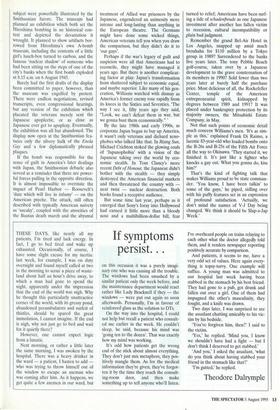If symptoms
persist. . .
THESE DAYS, like nearly all my patients, I'm tired and lack energy. In fact, I go to bed tired and wake up exhausted. Occasionally, of course, I have some slight excuse for my inertia: last week, for example, I was on duty overnight and found myself called at two in the morning to scour a piece of waste- land about half an hour's drive away, to which a man had gone to spend the night, apparently under the impression that the end of the world was nigh. Why he thought this particularly unattractive corner of the world, with its greasy pond, abandoned perambulators and surfeit of thistles, should be spared the great immolation, I cannot imagine. If the end is nigh, why not just go to bed and wait for it quietly there?
However, one cannot expect logic from a lunatic.
Next morning, or rather a little later the same morning, I was awoken by the hospital. There was a heavy drinker in the ward — a patient, I hasten to add — who was trying to throw himself out of the window to escape an axeman who was coming after him. As it happens, we get quite a few axemen in our ward, but on this occasion it was a purely imagi- nary one who was causing all the trouble. The windows had been smashed by a similar patient only the week before, and the maintenance department would react rather like Lady Bracknell if they — the windows — were put out again so soon afterwards. Personally, I'm in favour of reinforced glass as the solution to DTs.
On the way into the hospital, I could not help but recall a patient who consult- ed me earlier in the week. He couldn't sleep, he said, because his mind was 'going ten to the dozen'. That was exactly how my mind was working.
It's odd how patients get the wrong end of the stick about almost everything. They don't just mix metaphors, they pos- itively mangle them. As for the medical information they're given, they've forgot- ten it by the time they reach the consult- ing-room door, and then make something up to tell anyone who'll listen. I've overheard people on trains relaying to each other what the doctor allegedly told them, and it renders newspaper reporting positively accurate by comparison.
And patients, it seems to me, have a very odd set of values. Here again every- thing is topsy-turvy. One example will suffice. A young man was admitted to our hospital last week having been stabbed in the stomach by his best friend. They had gone to a pub, got drunk and fallen out over a girl. One of them had impugned the other's masculinity, they fought, and a knife was drawn.
Two days later, I was surprised to see the assailant chatting amicably to his vic- tim by his bedside.
'You've forgiven him, then?' I said to the victim.
'Yes,' he replied. 'Mind you, I know we shouldn't have had a fight — but 1 don't think I deserved to get stabbed.'
'And you,' I asked the assailant, 'what do you think about having stabbed your friend in the stomach like that?'
'I'm gutted,' he replied.
Theodore Dalrymple


















































 Previous page
Previous page